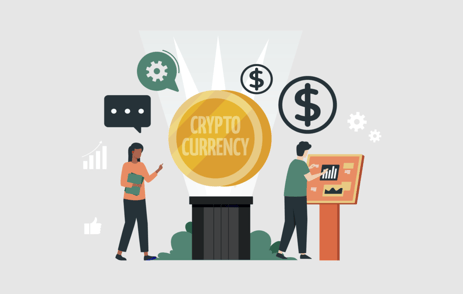Social tokens are a type of cryptocurrency – but this particular version is specific to an online community or influencer. They allow these creatives and communities to issue their own form of currency, creating an all-new path for monetization and revenue growth that also drives engagement.
How Are Social Tokens Used?
One of the reasons that social tokens are so interesting is that they can be used in various ways.
For starters, tokens might be given in exchange for contribution to the community – whether that be for work performed or for active participation – helping drive engagement.
Another use for social tokens is as a tool used to gain access to certain content, services or events. That can look like premium learning resources or a special session or workshop at your next event.
Social tokens can also be used as a way to gain voting powers. This is of particular interest to associations as it can reimagine the traditional board structure and create a more community-centric voting system.
With all that being said, social tokens essentially deliver the holder any benefits that the issuer determines. Once the specified benefits are decided upon, they are then programmed into the token through code on the blockchain, which then enforces those benefits automatically.
Does Demand Increase?
Since only a limited number of social tokens can exist, increasing their demand increases their value. This incentivizes the social token creator to find new and innovative ways to leverage them in delivering an expanding number of benefits to their community.
Alongside that growth in token usefulness, comes practical advantage to the creator as well. As the token value grows, its creator can increasingly use it as a form of compensation, inside that community. It literally becomes a more powerful form of payment among community members.
This is why the issuer is effectively creating group ownership of a digital economy – an economy built around their community.
The Fungibility of Social Tokens
Those following the crypto space are familiar with the growing popularity of NFTs. But non-fungible tokens differ from social tokens because social tokens are fungible. Each social token, as an individual unit, is interchangeable – just like a cryptocurrency.
Adding to the confusion is the name itself.
Social tokens are sometimes called "creator coins" or even "community tokens." But regardless, these are all the same thing.
Though most social tokens are on the Ethereum network, the specific blockchain isn't the important point – rather it’s their potential as a driver of business.
How Can Associations Use Them?
Social tokens are already providing innovative ways to help organizations increase both their revenue and customer loyalty, which is why any association professional should familiarize themselves with the possible uses of this new technology.
Some early incarnations of social token include:
- Community currency – Inside the creator's community, the social token becomes a form of direct payment
- Lead magnets – Social tokens can make excellent lead magnets. In this capacity, they provide incentives for members to join newsletters and other content subscriptions or sign-ups.
- Gated access – Through social tokens, organizations and creators can sell access to their content, premium resources or the community as a whole.
- Loyalty programs – Social tokens enable firms to create rewards programs for their most active audience. They do this by providing tiered levels of incentives inside the community.
- Sponsorships – Social tokens may be used to sell sponsorship spots for content. Examples include the full gamut of media formats, such as podcasts, online magazines and video series.
- Group ownership – When social tokens allow individuals to pay for membership, the buying of that social token is essentially a payment to own a piece of the community itself. This moves an audience to a community and ultimately transforms that into a social economy.
- Investment – With the token supply limited, rising demand increases its value. Of course, buyers should understand that these assets can rise or fall in value, so the risks are real, making them one of the more speculative use cases.
In all, social tokens are an amazing way to drive engagement and incentivize community-building – which can be of particular interest in the association and non-profit sector.
The Creator Economy
In the end, social tokens represent a new method for compensating creators whose content entertains, educates or informs. But just as importantly, these tokens also transform the relationship between creators and their audience.
Not only can creators and organizations build more opportunities to engage with their audience, but those most engaged members are also rewarded for their dedication and participation. While it’s still early and their full potential is not yet known, social tokens are yet another dimension of the Web3 dynamic. And the one thing that is clear, is their growing popularity signals that many creators are looking for new ways to leverage their content and create more meaningful communities.

April 26, 2022


